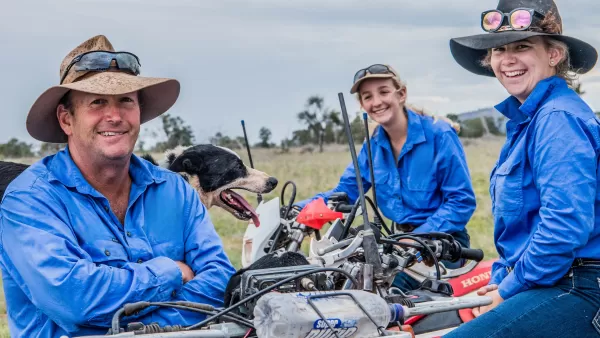Mackay Sugar Cane Farm
Energy Savings: 18% | Cost Savings: $2,353 | Capital Cost: $5,000 | CO2 Savings: 16.2 | Project Status: implemented
Industry:
Sugarcane
Location:
Mackay, Isaac and Whitsunday
Pump Type:
Centrifugal, Diesel Pump
Irrigation Type:
Flood
Technology:
Irrigation and Pumps, Solar Power and Renewables
A sugarcane farm located in the Mackay region could benefit from a recent Energy Savers Audit. Farming requires constant decision-making to maximise production and profit. Often irrigation systems are out of date and are in need of replacement to incorporate new technologies and updated knowledge.
The total area of cropping lands consists of 275ha and is divided into three sectors that are serviced by three pumps. Energy consumption from the site of the pump showed that a total 110,000kWh at a cost of $31,000 was used during the 2018-2019 period. A recent energy audit showed how improving the current systems can lead to energy and cost savings. The recommendations explored in the audit included:
- Replacing the star-delta starters on three pumps with Variable Speed Drives (VSD).
- Replace the diesel winch pump.
- Install a 10kW Solar PV system at the bore pump.
Table 1. Energy savings from audit recommendations
| Recommendation | Cost to Implement ($) | Energy Savings (kWh) | Cost Savings ($) | Payback Period (years) |
Emission Savings (tCO2-e) |
| Replace star delta starter with 30kW VSD | 3,500 | 4,420 | 2,939 | 1.2 | 3.6 |
| Replace star delta starter with 45kW VSD | 5,300 | 8,060 | 1,996 | 2.7 | 6.5 |
| Replace star delta starter 37kW VSD | 4,500 | 12,400 | 3,039 | 1.5 | 10 |
| Replace winch pump (Diesel) | 3,800 | 8,000 | 2,912 | 1.3 | 2 |
| Install 10kW Solar pump | 5,000 | 20,000 | 2,353 | 2.1 | 16.2 |
| Total | 22,100 | 52,880 | 13,239 | 1.7 | 38.3 |
Currently, all three pumps are being throttled back leading to a reduction in operating efficiency. Replacing the star-delta starters with new Variable Speed Drives (VSD) will eliminate this requirement with the pump now operating at the correct pressure, reducing energy consumption by 24,880kWh. Star delta starters are often used to limit start-up current. The motor will start winding up in a star wiring configuration and once ready move to the delta at the required operating speed. It is an “older” style of load reduction control whereas the new technology found in VSD can lead to greater efficiency gains. Varying the frequency allows the motor to spin at the required operating speed which varies greatly when moving water through irrigation systems. They can also help limit irrigation pipes bursting, as water pressure ramps up slowly and can stop pump operation should one occur. This goes beyond pure energy efficiency gains as time spent fixing irrigation lines can be better spent managing the farm.
A tariff review also showed that post-2020 cost savings of $2,297 per annum could be achieved by changing tariffs, in addition to the total energy efficiency savings of $13,329 per annum. Further savings include approximately 8,000kWh per annum from the replacement of the diesel winch pump and generating approximately 20,000 kWh of solar power to operate a bore pump, with potential exports to the grid.
The farmer proceeded with the implementation of the 10 kW solar system at the bore pump, with potential energy consumption savings of 18%, costs savings of 8%, and carbon emission savings of 16.2 tCO2-e per year. Actual savings will be updated once the measurement and verification process is complete.
Table 2. Pre and post audit energy consumption, costs, and energy productivity savings
| Metric | Pre-Audit | Post-Audit | Reduction (%) |
| Energy Consumption (kWh) | 110,000 | 90,000 | 18 |
| Cost ($) | 31,000 | 28,647 | 8 |
| Energy Productivity (kWh/ha) | 400 | 327 | 18 |
–
Energy and Productivity
Energy is one part of the complex link involved in farming and natural systems. Often energy, water, production, and climate are linked. A comprehensive energy audit will consider these factors and more in order to reduce costs and consumption onsite while maximising profit.
With no limitations to inputs of water, sugarcane production in the Mackay region and the tonnes of cane produced across 3 major soil types can be dependent on the type of irrigation system. Further, the region’s rainfall events are spiking mid-season, and early growth and late-maturing phases in the crop cycle are experiencing reduced rainfall leading to reduced yields.
With water availability low, at an average of 1.4ML/ha, the focus from productivity and economic position should be on reducing the cost of applying water and ensuring that water is not applied on later ratoons, where the cost of application may produce negative returns.
The savings expected from recommendations, tariff changes, and practice change of taking the crop from the 6th ratoon and reducing it to the 5th ratoon will increase net returns from $379 to $440/ha. The cost of applying water at sites one and two could be reduced from $155/ML to $105/ML, while site three is $82/ML.
An energy audit is a good investment
An energy audit is a great first step in moving a business towards a more efficient future by reducing energy use, costs, and Carbon emissions onsite.
The Energy Savers Plus Extension Program was delivered by the Queensland Farmers' Federation with support and funding from the Queensland Department of Energy and Public Works.

